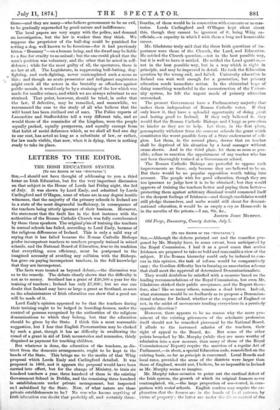LETTERS TO THE EDITOR.
THE IRISH EDUCATION SYSTEM.
[To THE EDITOR OF THE "SPECTATOR."]
an 1 subsidised by the State. Now, of what nature are these private establishments to be ? No one who knows anything of Irish education can doubt that probably all, and certainly three-
&R, —I should not have thought of addressing to you a third letter on Irish Education, but for the very important discussion on that subject in the House of Lords last Friday night, the 3rd of July. It was shown by Lord Emly, and admitted by Lords Carlingford and O'Hagan, none of whom are in any degree hostile witnesses, that the majority of the primary schools in Ireland are in a state of the most disgraceful inefficiency, in consequence of the teachers being utterly ignorant of their business. Moreover, the statement that the fault lies in the first instance with the authorities of the Roman Catholic Church was fully corroborated by these three speakers. The original plan of training the teachers in normal schools has failed, according to Lord Emly, because of the religious differences of Ireland. This is only a mild way of saying that it has failed because the Roman Catholic Bishops prefer incompetent teachers to teachers properly trained in mixed schools, and the National Board of Education, true to its tradition that everything, even efficiency, must be postponed to the imagined necessity of avoiding any collision with the Bishops, has gone on paying incompetent teachers, in the full knowledge that they are incompetent.
The facts were treated as beyond debate,—the discussion was as to the remedy. The debate clearly shows that the difficulty is not as to money. Scotland has a grant of £20,500 a year for the training of teachers ; Ireland has only £7,600 ; but no one can doubt that Ireland may have as large a- grant as Scotland, so soon as the administrators of Irish education can show that a good use will be made of it.
Lord Emly's opinion appeared to be that the teachers during their training ought to be lodged in boarding-houses, under the
control of persons recognised by the authorities of the religious denominations to which they belong, but that the education I should be given by the State. I think this a most reasonable suggestion, but I fear that English Protestantism may be choked by such a gnat, though it has no difficulty in swallowing the camel of a grant in aid of Irish monasteries and nunneries, thinly disguised as payment for teaching children.
But whatever is done, the education of the teachers, as dis- tinct from the domestic arrangements, ought to be kept in the *hands of the State. This brings me to the merits of that Whig -proposal which Lords Emly and Carlingford detailed. It was„
proposed in 1866, and it appears the proposal would have been carried into effect, but for the change of Ministry, to train six hundred teachers a year, three hundred of them in the existing Government School in Dublin, and the remaining three hundred in establishments under private management, but inspected fourths, of them would be in connection with convents or monas- teries. Lords Carlingford and O'Hagan kept silent about this, though they cannot be ignorant of it, being Whig ex- officials,—a capacity in which I wish them a long and honourable career.
Mr. Gladstone truly said that the three Irish questions of im- portance were those of the Church, the Land, and Education. He settled the Church question,—not in the best possible way, but it is well to have it settled. He settled the Land question,— not in the best possible way, but in a way which is right in principle, and may be improved in detail. He took the Education question by the wrong end, and failed. University education in Ireland can wait well enough for a generation, but primary education needs immediate action. In the chimerical hope of doing something wonderful in the reconstruction of the Univer- sity system, he left the urgent needs of primary education untouched.
The present Government have a Parliamentary majority that makes them independent of Roman Catholic votes. If they only knew it, they have a splendid opportunity of doing great and lasting good to Ireland. If they only believed it, they would find the Roman Catholic Bishops and Clergy as powerless to hinder as they are to help. Let them, in the first place, peremptorily withdraw from the convent schools the grant which constitutes the worst possible form of a State endowment of reli- gion. Let them, in the second place, decree that no teacher shall be deprived of his situation by a local manager without cause shown. And in the third place, let them as soon as pos- sible, refuse to sanction the appointment of any teacher who has not been thoroughly trained at a Government school.
The Roman Catholic Bishops are powerful to oppose such improvements as these, only because they are believed to be so. But there would be no popular opposition worth taking into account. The people wish for good education, though they are too ignorant to judge how it is to be obtained ; but they would approve of training the teachers better and paying them better— protecting them against arbitrary dismissal would commend itself to the deepest feelings of Irishmen—and though candidates would still pledge themselves, and mobs would still shout for denomi national education, it would be as empty a cry as Home-rule is in the mouths of the priests.—I am, Sir, &c.,


































 Previous page
Previous page